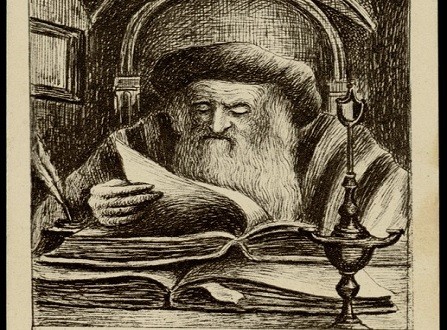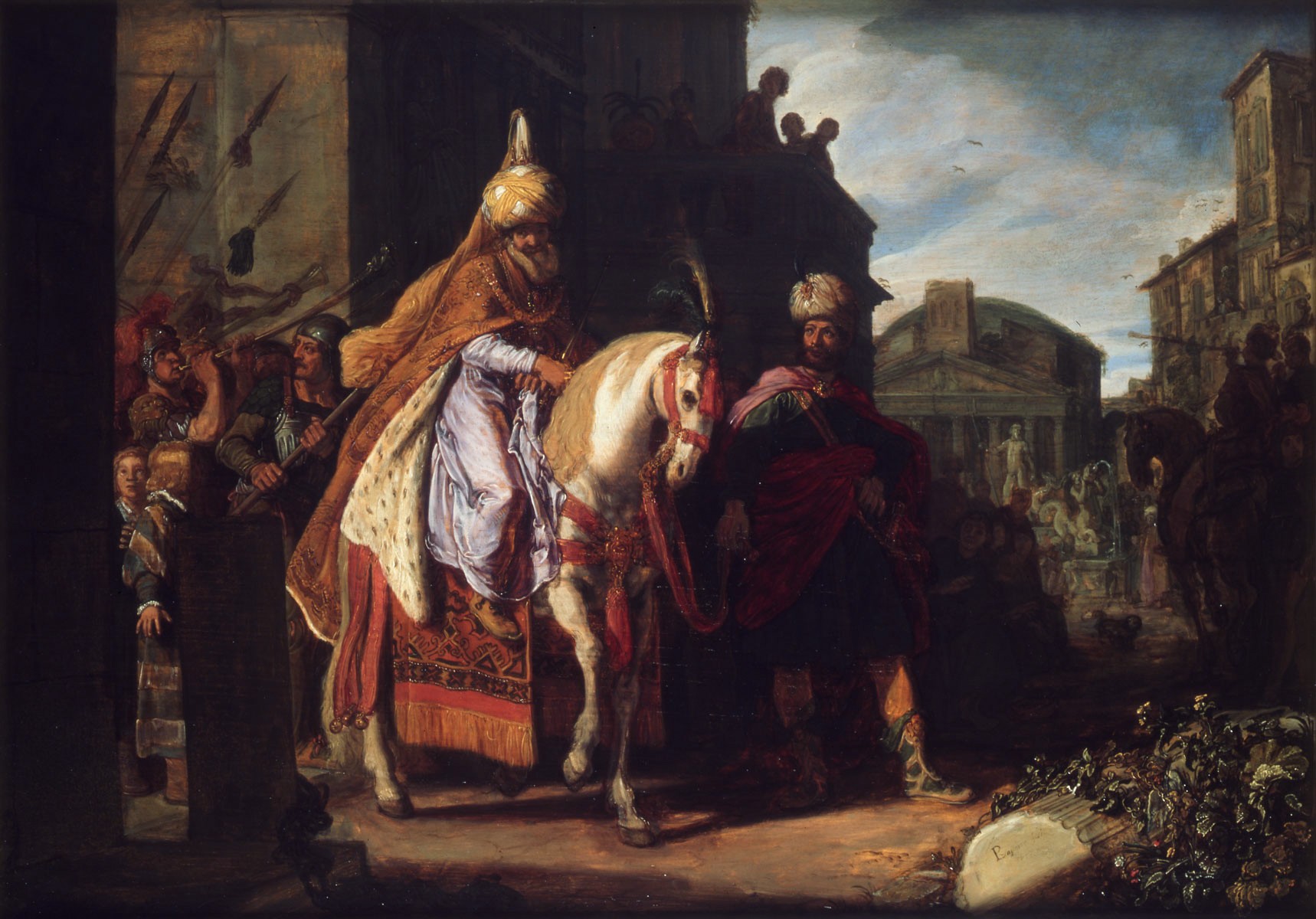Overview: The Orthodox obsession with Rashi, the rabbis who criticized his approach, his unwavering commitment to Midrash, and the overall approach of Rashi in his commentary.
The historical obsession with Rashi
In a conversation with a friend about the meaning of a certain biblical verse, he passionately argued “But Rashi says otherwise!” This had me wonder if according to Orthodox belief, Rashi ascended Mt. Sinai along with Moses to receive the Torah. But when I looked up the biblical narrative of Mt. Sinai, I saw no mention of Rashi. So why do so many Jews take his word as the absolute Word of God?
There are many traditional rabbinic commentators, including those with vastly different approaches to the Torah’s text than Rashi. So why has Rashi’s become so popular and eventually standardized in the printed Chumashim? Rashi’s commentary was the first comprehensible commentary and therefore gained much traction at first. Also his (fundamentalist, contra-rationalism) style of learning held sway in France for many years with the Baalei Tosafot followed by the later Kabbalists to some extent. His unique approach lacks the boring dry commentary of Ibn Ezra and Rashbam and enriches the text with a much broader storyline and one that is sensible to the religious standards of nowadays (e.g. making the Patriarchs keep all the Mitzvos[1] and the Matriarch Sarah observing Niddah, candles, and Challah[2]).
Many rationalists, however, tend to appreciate Ibn Ezra and Rashbam’s approach in their commentary since it makes up nothing new and tells us the dry raw facts without adding any spices to the storyline as told.
Rashi’s claim for simple readings
וישמעו. יֵשׁ מִדְרְשֵׁי אַגָּדָה רַבִּים וּכְבָר סִדְּרוּם רַבּוֹתֵינוּ עַל מְכוֹנָם בִּבְ”רַ וּבִשְׁאָר מִדְרָשׁוֹת; וַאֲנִי לֹא בָאתִי אֶלָּא לִפְשׁוּטוֹ שֶׁל מִקְרָא וּלְאַגָּדָה הַמְיַשֶּׁבֶת דִּבְרֵי הַמִּקְרָא דָבָר דָּבוּר עַל אֳפַנָּיו:
AND THEY HEARD — There are many Midrashic explanations and our Teachers have already collected them in their appropriate places in Genesis Rabbah and in other Midrashim. I, however, am only concerned with the plain sense of Scripture and with such Agadoth that explain the words of Scripture in a manner that fits in with them.
(Rashi on Genesis 3:8)
Other times as well, Rashi points out how his goal is to interpret the literal meaning.[3]
This approach of Rashi – a plain, literal interpretation – was in contrast to earlier works of Midrash that dealt with homiletics and non-literal interpretations of the verses that often even contradicted the plain meaning of the verse.
However, even Rashi’s self-described agenda seems to be a stretch in some cases where Rashi seems to reject the literal understanding of the verse. We will bring some examples followed by an explanation of Rashi’s approach that should answer most of the issues with Rashi.
Rashbam and Rashi’s conversation
In an intriguing conversation between Rashbam and his grandfather Rashi, Rashbam criticizes his grandfather’s extensive usage of Midrashic interpretations in biblical text. Rashi proceeds to admit that he would have updated his commentary in his later years had he had more time on his hands.
אלה תולדות יעקב – ישכילו ויבינו אוהבי שכל מה שלימדונו רבותינו, כי אין מקרא יוצא מידי פשוטו. אף כי עיקרה של תורה באה ללמדנו ולהודיענו ברמיזת הפשט וההגדות וההלכות והדינין ועל ידי אריכות הלשון ועל ידי שלושים ושתים מידות של ר’ אליעזר בנו של ר’ יוסי הגלילי וע”י שלש עשרה מידות של ר’ ישמעאל והראשונים מתוך חסידותם נתעסקו לנטות אחרי הדרשות שהן עיקר ומתוך כך לא הורגלו בעומק פשוטו של מקרא. ולפי שאמרו חכמים: אל תרבו בניכם בהגיון. וגם אמרו: העוסק במקרא מדה ואינה מדה, העוסק בתלמוד אין לך מדה גדולה מזו ומתוך כך לא הורגלו כל כך בפשוטן של מקראות וכדאמרינן במסכת שבת: הוינא בר תמני סרי שנין וגרסינן כולה תלמודא ולא הוה ידענא דאין מקרא יוצא מידי פשוטו. וגם רבינו שלמה אבי אמי מאיר עיני גולה שפירש תורה נביאים וכתובים, נתן לב לפרש פשוטו של מקרא. ואף אני שמואל ב”ר מאיר חתנו זצ”ל נתווכחתי עמו ולפניו והודה לי שאילו היה לו פנאי, היה צריך לעשות פירושים אחרים לפי הפשטות המתחדשים בכל יום. ועתה יראו המשכילים מה שפירשו הראשונים.
THIS, THEN, IS THE LINE OF YA’AKOV. Intelligent people should discern and understand what our Rabbis taught us, that Scripture never forsakes its plain sense. Even though, essentially, Torah comes to teach us and inform us through hints from the plain sense, narratives, laws, and rules, and through elaborations of the text and the 32 principles of R’ Eliezer the son of R’ Yosi HaG’lili, and through the 13 principles of R’ Yishma’el. And the early Sages, because of their piety, engaged in inclining after the drashot, which are primary, and because of this, they were not familiar with the deep plain sense of Scripture. As the Sages said, “Do not make your children engage much in Scripture” [see Ber. 28a and Rashi there]. And they also said (B.M. 33a), “One who occupies himself with Scripture [alone] is meritorious but not very much so, … but one who engages in Talmud, there is no greater measure than this.” And in this way, they were not so familiar with the plain sense of Scriptural passages. And as it says in Mas. Shabbat, “I was 18 years old and had read the entire Talmud, and I did not know that Scripture never forsakes its plain sense.” And our Master Shlomo, my maternal grandfather, the enlightener of the Exile, who expounded on Torah, N’vi’im, and K’tuvim, set his mind also on explaining the plain sense of Scripture. However, I, Sh’mu’el the son of R’ Meir, his son-in-law, may his sainted name be for a blessing, argued with him and before him, and he acknowledged to me that if he had had more time, he would need to produce other commentaries according to the plain meanings that renew each day.
(Rashbam on Gen 37:2)
Ibn Ezra’s criticism of Rashi’s commentary
…כרב שלמה ז”ל שפירש התנ”ך ע”ד דרש והוא חושב שהוא על דרך פשט ואין בספריו פשט רק אחד מני אלף וחכמי דורנו יתהללו באלה הספרים
…like Rabbi Solomon, of blessed memory, who wrote a derash commentary on the Bible. He thought that it was a peshat commentary, but in his books only one of a thousand comments is peshat. The scholars of our generation love books like this.
(Ibn Ezra in Safa Berurah p. 5)
Examples where Rashi veers off
Here are several examples where Rashi vividly leaves the plain meaning of the text:
וְהִנֵּה־ה֡וּא שָׂם֩ עֲלִילֹ֨ת דְּבָרִ֜ים לֵאמֹ֗ר לֹֽא־מָצָ֤אתִי לְבִתְּךָ֙ בְּתוּלִ֔ים וְאֵ֖לֶּה בְּתוּלֵ֣י בִתִּ֑י וּפָֽרְשׂוּ֙ הַשִּׂמְלָ֔ה לִפְנֵ֖י זִקְנֵ֥י הָעִֽיר׃
so he has made up charges, saying, ‘I did not find your daughter a virgin.’ But here is the evidence of my daughter’s virginity!” And they shall spread out the cloth before the elders of the town.
ופרשו השמלה. הֲרֵי זֶה מָשָׁל, מְחֻוָּרִין הַדְּבָרִים כַּשִּׂמְלָה
AND THEY SHALL SPREAD THE CLOTH [BEFORE THE ELDERS OF THE CITY] — This is a figurative expression: they must make the matter as white (as clear) as a sheet (Sifrei Devarim 237:1; Ketubot 46a).
(Deut. 22:17)
וַתְּדַבֵּ֨ר מִרְיָ֤ם וְאַהֲרֹן֙ בְּמֹשֶׁ֔ה עַל־אֹד֛וֹת הָאִשָּׁ֥ה הַכֻּשִׁ֖ית אֲשֶׁ֣ר לָקָ֑ח כִּֽי־אִשָּׁ֥ה כֻשִׁ֖ית לָקָֽח׃
Miriam and Aaron spoke against Moses because of the Cushite woman he had married: “He married a Cushite woman!”
האשה הכשית. מַגִּיד שֶׁהַכֹּל מוֹדִים בְּיָפְיָהּ כְּשֵׁם שֶׁהַכֹּל מוֹדִים בְּשַׁחֲרוּתוֹ שֶׁל כּוּשִׁי:
THE CUSHITE WOMAN — This tells us that all agreed as to her beauty just as all agree as to the blackness of an Ethiopian (cf. Sifrei Bamidbar 99).
כושית. בְּגִימַטְרִיָּא יְפַת מַרְאֶה:
Kushit — The numerical value of this word (736) is the same as that of יפת מראה, a woman of beautiful appearance.
על אדות האשה. עַל אוֹדוֹת גֵּרוּשֶׁיהָ:
BECAUSE OF THE [CUSHITE] WOMAN — because of her having been divorced by Moses (cf. Note on previous passage).
כי אשה כשית לקח. מַה תַּ”ל? אֶלָּא יֵשׁ לְךְ אִשָּׁה נָאָה בְּיָפְיָהּ וְאֵין נָאָה בְמַעֲשֶׂיהָ, בְּמַעֲשֶׂיהָ וְלֹא בְיָפְיָהּ, אֲבָל זֹאת נָאָה בַכֹּל:
FOR HE HAD MARRIED A CUSHITE WOMAN — What is the force of this statement? (It appears superfluous; since על אדות וכו has been explained to refer to Moses having divorced his Cushite wife, it is unnecessary to state afterwards that he had married her)! But it is made to suggest the following: You may find a woman who is pleasant an account of her beauty but who is not pleasant by reason of her deeds (conduct); or one pleasant because of her conduct but not because of her beauty. This woman, however, was pleasant in every respect (Sifrei Bamidbar 99).
האשה הכשית. עַל שֵׁם נוֹיָהּ נִקְרֵאת כּוּשִׁית, כְּאָדָם הַקּוֹרֵא אֶת בְּנוֹ נָאֶה כּוּשִׁי, כְּדֵי שֶׁלֹּא תִּשְׁלֹט בּוֹ עַיִן רָעָה:
THE CUSHITE WOMAN — Because of her beauty-she was called, “the Aethiopian” just as a man calls his handsome son “Moor”, in order that the evil eye should have no power over him (Midrash Tanchuma, Tzav 13).
(Num. 12:1)
וַיֹּ֤אמֶר יְהוָה֙ אֶל־אַבְרָ֔ם לֶךְ־לְךָ֛ מֵאַרְצְךָ֥ וּמִמּֽוֹלַדְתְּךָ֖ וּמִבֵּ֣ית אָבִ֑יךָ אֶל־הָאָ֖רֶץ אֲשֶׁ֥ר אַרְאֶֽךָּ׃
The LORD said to Abram, “Go forth from your native land and from your father’s house to the land that I will show you.
לך לך. לַהֲנָאָתְךָ וּלְטוֹבָתְךָ, שָׁם אֶעֶשְׂךָ לְגוֹי גָדוֹל, כָּאן אִי אַתָּה זוֹכֶה לְבָנִים, וְעוֹד שֶׁאוֹדִיעַ טִבְעֲךָ בָּעוֹלָם:
GET THEE OUT (literally, go for thyself) — for your own benefit, for your own good: there I will make of you a great nation whilst here you will not merit the privilege of having children (Rosh Hashanah 16b). Furthermore, I shall make known your character throughout the world (Midrash Tanchuma, Lech Lecha 3)
(Gen. 12:1)
וַיְהִ֗י בִּשְׁכֹּ֤ן יִשְׂרָאֵל֙ בָּאָ֣רֶץ הַהִ֔וא וַיֵּ֣לֶךְ רְאוּבֵ֔ן וַיִּשְׁכַּ֕ב֙ אֶת־בִּלְהָ֖ה֙ פִּילֶ֣גֶשׁ אָבִ֑֔יו וַיִּשְׁמַ֖ע יִשְׂרָאֵֽ֑ל
While Israel stayed in that land, Reuben went and lay with Bilhah, his father’s concubine; and Israel found out.
וישכב. מִתּוֹךְ שֶׁבִּלְבֵּל מִשְׁכָּבוֹ, מַעֲלֶה עָלָיו הַכָּתוּב כְּאִלּוּ שְׁכָבָהּ; וְלָמָּה בִלְבֵּל וְחִלֵּל יְצוּעָיו? שֶׁכְּשֶׁמֵּתָה רָחֵל נָטַל יַעֲקֹב מִטָּתוֹ, שֶׁהָיְתָה נְתוּנָה תָּדִיר בְּאֹהֶל רָחֵל וְלֹא בִּשְׁאָר אֹהָלִים, וּנְתָנָהּ בְּאֹהֶל בִּלְהָה; בָּא רְאוּבֵן וְתָבַע עֶלְבּוֹן אִמּוֹ, אָמַר אִם אֲחוֹת אִמִּי הָיְתָה צָרָה לְאִמִּי, שִׁפְחַת אֲחוֹת אִמִּי תְּהֵא צָרָה לְאִמִּי? לְכָךְ בִּלְבֵּל (שבת נ”ה):
AND HE LAY — Because he had disturbed his couch Scripture accounts it to him as though he had actually sinned in this manner. But why did he disturb his couch? When Rachel died Jacob removed to Bilhah’s tent and Reuben came and protested against the slight thus inflicted on his mother (Leah). He said: “If my mother’s sister was her rival, is that any reason why the handmaid of my mother’s sister should become a rival to her!” On this account he disturbed the couch (Shabbat 55b).
(Gen. 35:22)
וּמִכָּל־הָ֠חַי מִֽכָּל־בָּשָׂ֞ר שְׁנַ֧יִם מִכֹּ֛ל תָּבִ֥יא אֶל־הַתֵּבָ֖ה לְהַחֲיֹ֣ת אִתָּ֑ךְ זָכָ֥ר וּנְקֵבָ֖ה יִֽהְיֽוּ׃
And of all that lives, of all flesh, you shall take two of each into the ark to keep alive with you; they shall be male and female.
ומכל החי. אֲפִלּוּ שֵׁדִים:
AND OF EVERY LIVING THING — Even of demons (Genesis Rabbah 31:13).
(Gen 6:19)
וַיַּסֵּ֨ב אֱלֹהִ֧ים ׀ אֶת־הָעָ֛ם דֶּ֥רֶךְ הַמִּדְבָּ֖ר יַם־ס֑וּף וַחֲמֻשִׁ֛ים עָל֥וּ בְנֵי־יִשְׂרָאֵ֖ל מֵאֶ֥רֶץ מִצְרָֽיִם׃
So God led the people roundabout, by way of the wilderness at the Sea of Reeds. Now the Israelites went up armed out of the land of Egypt.
וחמשים. אֵין חֲמוּשִׁים אֶלָּא מְזֻיָּנִים;…. דָּבָר אַחֵר, חֲמֻשִׁים אֶחָד מֵחֲמִשָּׁה יָצְאוּ וְאַרְבָּעָה חֲלָקִים מֵתוּ בִּשְׁלֹשֶׁת יְמֵי אֲפֵלָה (מכילתא):
HAMUSHIM – The word חמשים means provided with weapons (Mekhilta d’Rabbi Yishmael 13:19:2)…. Another explanation of חמשים is: only one out of five (חמשה) went forth from Egypt, and four parts of the people died during the three days of darkness because they were unworthy of being delivered (Mekhilta d’Rabbi Yishmael 13:19:3; cf. Rashi on 10:22).
(Ex. 13:18)
וַיִּשְׁמַ֣ע אַבְרָ֔ם כִּ֥י נִשְׁבָּ֖ה אָחִ֑יו וַיָּ֨רֶק אֶת־חֲנִיכָ֜יו יְלִידֵ֣י בֵית֗וֹ שְׁמֹנָ֤ה עָשָׂר֙ וּשְׁלֹ֣שׁ מֵא֔וֹת וַיִּרְדֹּ֖ף עַד־דָּֽן׃
When Abram heard that his kinsman had been taken captive, he mustered his retainers, born into his household, numbering three hundred and eighteen, and went in pursuit as far as Dan.
שמנה עשר וגו’. רַבּוֹתֵינוּ אָמְרוּ אֱלִיעֶזֶר לְבַדּוֹ הָיָה (נדרים ל”ב), וְהוּא מִנְיַן גִּימַטְרִיָּא שֶׁל שְׁמוֹ:
THREE HUNDRED AND EIGHTEEN — Our Rabbis said, “It was Eliezer alone whom he armed and it (318) is the numerical value of his name” (Nedarim 32a).
(Gen. 14:14)
וַיֹּ֨אמֶר יְהוָ֜ה אֵלָ֗יו מִ֣י שָׂ֣ם פֶּה֮ לָֽאָדָם֒ א֚וֹ מִֽי־יָשׂ֣וּם אִלֵּ֔ם א֣וֹ חֵרֵ֔שׁ א֥וֹ פִקֵּ֖חַ א֣וֹ עִוֵּ֑ר הֲלֹ֥א אָנֹכִ֖י יְהוָֽה׃
And the LORD said to him, “Who gives man speech? Who makes him dumb or deaf, seeing or blind? Is it not I, the LORD?
מי שם פה וגו’. מִי לִמְּדֶךָ לְדַבֵּר, כְּשֶׁהָיִיתָ נִדּוֹן לִפְנֵי פַרְעֹה עַל הַמִּצְרִי?
WHO HATH MADE MAN’S MOUTH etc.? — Who taught you to speak when you were arraigned in judgment before Pharaoh on account of the Egyptian whom you slew?
או מי ישום אלם. מִי עָשָׂה פַרְעֹה אִלֵּם, שֶׁלֹּא נִתְאַמֵּץ בְּמִצְוַת הֲרִיגָתְךָ, וְאֶת מְשָׁרְתָיו חֵרְשִׁים שֶׁלֹּא שָׁמְעוּ בְּצַוּוֹתוֹ עָלֶיךָ, וְאֶת אֶסְפַּקְלָטוֹרִין הַהוֹרְגִים מִי עֲשָׂאָם עִוְרִים שֶׁלֹּא רָאוּ כְּשֶׁבָּרַחְתָּ מִן הַבִּימָה וְנִמְלַטְתָּ?
OR WHO MAKETH THE DUMB — Who made Pharaoh dumb so that he could not insist upon the carrying out of his command to kill you? Who made his ministers deaf so that they could not hear when he gave orders concerning you? And the executioners whose task it was to slay — who made them blind so that they could not see when you fled from the platform (raised place of execution) and escaped? (Midrash Tanchuma, Shemot 10)
(Ex. 4:11)
וַיְצַ֤ו אֹתָם֙ לֵאמֹ֔ר כֹּ֣ה תֹאמְר֔וּן לַֽאדֹנִ֖י לְעֵשָׂ֑ו כֹּ֤ה אָמַר֙ עַבְדְּךָ֣ יַעֲקֹ֔ב עִם־לָבָ֣ן גַּ֔רְתִּי וָאֵחַ֖ר עַד־עָֽתָּה׃
and instructed them as follows, “Thus shall you say, ‘To my lord Esau, thus says your servant Jacob: I stayed with Laban and remained until now;
גרתי. דָּ”אַ גַּרְתִּי בְּגִימַטְרִיָּא תרי”ג, כְּלוֹמַר, עִם לָבָן גַּרְתִּי וְתַרְיַ”ג מִצְוֹת שָׁמַרְתִּי וְלֹא לָמַדְתִּי מִמַּעֲשָׂיו הָרָעִים:
I HAVE SOJOURNED — … Another explanation: the word גרתי has the numerical value of 613 – תרי״ג – it is as much as to say, “Though I have sojourned with Laban, the wicked, I have observed the תרי״ג מצות, the 613 Divine Commandments, and I have learned naught of his evil ways.
(Gen. 32:5)
Rashi’s methodology based on Midrash and Rabbi Akiva
Rashi has many disputed versions and later editors seemed to have added their glosses into Rashi on many occasions.[4] It’s therefore very difficult to know exactly what Rashi actually wrote and what not.
Rashi’s understanding was that every word in Torah had a deep reason why it was being told. Not merely to place a literary framework of time or place but rather to convey a deeper theological or substantial literary message. This stems from his belief that since Torah is a divine text, therefore no extra words would be written. Instead, each seemingly extra word needs to have a deeper explanation, and he suggests explanations for that. Here are some examples:
וַתֹּ֤סֶף עוֹד֙ וַתֵּ֣לֶד בֵּ֔ן וַתִּקְרָ֥א אֶת־שְׁמ֖וֹ שֵׁלָ֑ה וְהָיָ֥ה בִכְזִ֖יב בְּלִדְתָּ֥הּ אֹתֽוֹ׃
Once again she bore a son, and named him Shelah; he was at Chezib when she bore him.
והיה בכזיב. שֵׁם הַמָּקוֹם. וְאוֹמֵר אֲנִי עַל שֵׁם שֶׁפָּסְקָה מִלֶּדֶת נִקְרָא כְזִיב, לְשׁוֹן הָיוֹ תִהְיֶה לִי כְּמוֹ אַכְזָב (ירמיהו ט”ו), אֲשֶׁר לֹא יְכַזְּבוּ מֵימָיו (ישעיהו נ”ח), וְאִם לֹא כֵן מַה בָּא לְהוֹדִיעֵנוּ:
AND HE WAS AT CHEZIB — the name of a place. I am of the opinion that it was called Chezib because there she ceased bearing. This meaning of the word occurs in (Jeremiah 15:18) “wilt thou indeed be unto me as an (אכזב) a deceiver (one who ceases to keep faith)”, and (Isaiah 58:11) “whose waters do not (יכזבו) fail (cease)”. For if this be not so (that it was called Chezib for the reason stated) what is it intended to tell us (what reason is there for telling us where he was at that time)?
(Gen. 38:5)
וַיָּבֹ֞א יִתְר֨וֹ חֹתֵ֥ן מֹשֶׁ֛ה וּבָנָ֥יו וְאִשְׁתּ֖וֹ אֶל־מֹשֶׁ֑ה אֶל־הַמִּדְבָּ֗ר אֲשֶׁר־ה֛וּא חֹנֶ֥ה שָׁ֖ם הַ֥ר הָאֱלֹהִֽים׃
Jethro, Moses’ father-in-law, brought Moses’ sons and wife to him in the wilderness, where he was encamped at the mountain of God.
אל המדבר. אַף אָנוּ יוֹדְעִים שֶׁבַּמִּדְבָּר הָיוּ אֶלָּא בְּשִׁבְחוֹ שֶׁל יִתְרוֹ דִּבֵּר הַכָּתוּב, שֶׁהָיָה יוֹשֵׁב בִּכְבוֹדוֹ שֶׁל עוֹלָם וּנְדָבוֹ לִבּוֹ לָצֵאת אֶל הַמִּדְבָּר, מְקוֹם תֹּהוּ לִשְׁמֹעַ דִּבְרֵי תוֹרָה (שם):
INTO THE DESERT — Indeed we know that they were in the wilderness, and it appears unnecessary to state that Jethro came to Moses there. But by stressing this Scripture is speaking in praise of Jethro: that he was living amidst all the splendour that the world could provide, and nevertheless his heart prompted him to go forth into the desert, a waste place (Mekhilta d’Rabbi Yishmael 18:5:2), to hearken to the words of the Torah.
(Ex. 18:5)
Rashi clearly took Midrash as literal fact rather than personal opinion and homiletics. See article here for others who disagreed with that approach to Midrash, opting instead for a more rational take on Midrash as a whole. Rashi is from the first to introduce and influence the current Charedi perspective of Aggadah as literal, undisputed fact. Only about 25% of Rashi is original, mostly dealing with linguistic issues, while the rest is sourced in Midrash.
Rashi made use of aggadic Midrash in five ways: to resolve a difficulty in the wording of a passage, to explain the purpose of seemingly superfluous words, to identify anonymous people or places, to broaden the narrative background for the actions and motives of the protagonists, and to make a point for pedagogical purposes.[5]
Oftentimes, a Midrash will be cited as supplementary to the commentary (such as ומדרשו or ובמדרש רבה) perhaps because Rashi appreciated these Midrashim while realizing that these Midrashim go against the literal understanding of the verse. However, this is up for debate, and some would argue that Rashi liberally cites Midrashim irrespective of there being an “extra word” in the verse.[6]
Ibn Ezra and Rashbam were more critical thinkers than Rashi and their commentaries reflect that. It’s an honest reading of the text – what the text seems to be saying and nothing more (although sometimes they incorporated the Halachic interpretations, particularly so with Ibn Ezra). Rashi, on the other hand, cites anything that could fit with the text and supports Rashi’s theological approach that no words are “extra” in the Torah and that Midrashic literature is a reliable interpretation of the text – if it can fit in the words. Thus, Rashi was clearly limited by his theological approach to Torah and his unwavering acceptance for Midrash. In contrast, Ibn Ezra and Rashbam were more skeptical of Midrash and only commented what they saw from the text itself and logical reasoning.
Perhaps, it can be argued, that Rashi as a whole takes the position of Rabbi Akiva who doesn’t believe in any “extra” words in Torah, whereas Ibn Ezra and Rashbam are fond of the position of Rabbi Yishmael that “the Torah speaks in the language of man.”[7] Therefore, according to Ibn Ezra and Rashbam we ought not to derive interpretation from these alleged “extra” words in Torah, since these words are natural for a human literary text that the Torah attempts to mimic.
Scholars recognize that much of Rashi is not from his pen
Rashi scholars have noticed several pens in Rashi, with some or much of the Rashi commentary we have now being additions from writers later than Rashi. Early manuscripts lack some parts that are now found in Rashi.[8] Perhaps a few more people were together on Mt. Sinai alongside Moses and Rashi!

___________________
[1] Gen. 32:5 and Gen. 25:5, 24:63.
[2] Gen. 18:8-9, 24:67.
[3] Ex. 2:5, Gen. 3:24 (see also here for more examples).
[4] See Rashi by Avraham Grossman Ch. 4. https://kotzkblog.blogspot.com/2019/02/213-and-what-does-rashi-say.html
[5] Rashi, Avraham Grossman, p. 82.
[6] https://www.thetorah.com/article/rashi-on-the-torah-what-kind-of-commentary-is-it
[7] Berakhot 31b.




